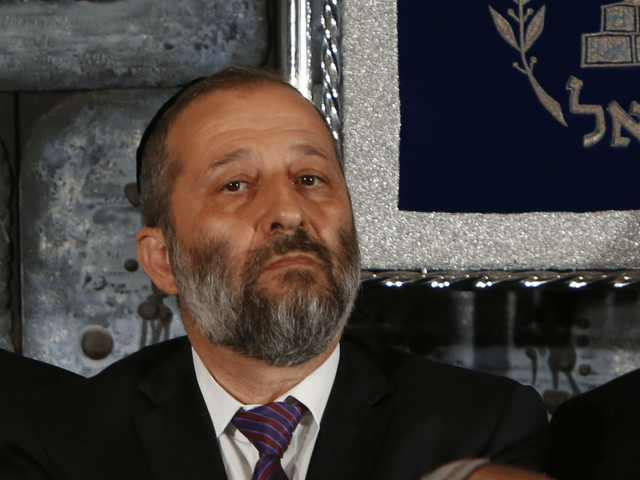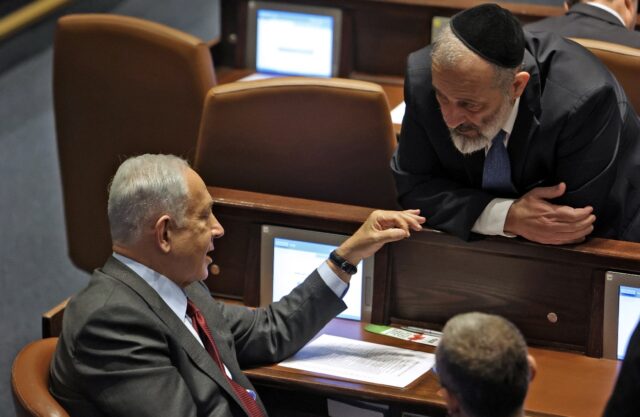Israel’s left-wing Supreme Court, which is currently the subject of intense debate due to a government proposal to overhaul it, issued a bombshell ruling that Prime Minister Benjamin Netanyahu must fire a key ally and party leader from his ministerial position.
Ten of 11 High Court judges found it “unreasonable to the extreme” that Aryeh Deri, the longtime Netnayahu coalition ally and head of the ultra-Orthodox Shas party, should serve as health and interior minister after he was convicted of tax offenses.
Deri responded that he would not go quietly. “When they close the door on us, we’ll get in through the window. When they close the window, we’ll break through the ceiling,” he said.
Fellow Shas Knesset members have warned that Deri’s forced removal could trigger a major coalition crisis and the possible collapse of the government again. Shas MK Yaakov Margi said: “If Aryeh Deri isn’t in the government, there isn’t a government.”
Opposition leader Yair Lapid warned that if Netanyahu didn’t go ahead and fire Deri, his government would be “breaking the law” and in such a case “would lose the right to demand that citizens obey the law.”
Israel “will be catapulted into an unprecedented constitutional crisis and will no longer be a democracy,” he added.
The Supreme Court ruling came amid widespread protests over proposed reforms to the country’s left-leaning judiciary.

File/A file picture taken on May 19, 2015, shows Israeli Minister of Economy Aryeh Deri looking on during the traditional photograph in honor of the swearing in of the 34th government of Israel at the Presidential compound in Jerusalem. (GALI TIBBON/AFP/Getty)
Among the proposals presented by Justice Minister Yariv Levin, is nixing the so-called “reasonableness measure” by which the Supreme Court can strike down any law or government action it deems “unreasonable.” For example, the court ruled it “unreasonable” to allow religious Jews to pray on the Temple Mount – Judaism’s holiest site – because doing so would anger the Arab world.
Advocates of the reform have claimed that it would correct a power grab by the Supreme Court and restore a balance of power to the executive branch.
Legal expert Professor Eugene Kontorovich said the court’s ruling proved that “urgent reform” of the judiciary was needed, since striking down the appointment was based not on law but on the court’s own “notions of propriety.”
Kontorovich, who is the director of International Law at the Jerusalem-based Kohelet Policy Forum which has advocated judicial reform in Israel for a decade, said the law does not contradict the validity of Deri’s appointment, however distasteful it might be.
“Rather, they said that appointing him in particular, given his checkered past, is ‘unreasonable’ – in other words, a bad idea. That is a reasonable policy position, but it has nothing to do with what the judges are supposed to be doing – interpreting law, or minority rights,” he said.
The ruling proves that the Supreme Court “seeks to exercise power over every aspect of Israeli life, even the outcome of elections.”
“That the Supreme Court can dismantle an elected coalition based not on the law, but on its own notions of propriety, powerfully illustrates the need for urgent reform,” he said.

Israel’s Interior and Health Minister Aryeh Deri (C) reacts as he sits between Prime Minister Benjamin Netanyahu (R) and Justice Minister Yariv Levin (L) during a weekly cabinet meeting at the Prime Minister’s office in Jerusalem, on January 8, 2023. (RONEN ZVULUN/POOL/AFP via Getty)
In an interview with Breitbart News earlier in the week, Kontorovich accused the Supreme Court of passing rulings without proper due process, noting the court decides around 12,000 cases every year. By way of comparison, the U.S. Supreme Court averages about 80 cases per year.
“All the Supreme Court needs to do is say ‘illegal,’ and [the legislation is] struck down – they don’t even need to issue an opinion,” he said, pointing to a recent example with the controversial Lebanon gas deal, in which the court has still not written an opinion.
In contrast, the Knesset has to write a law and pass it through three readings.
“The Knesset doesn’t stand a chance. It can’t keep up. You can’t get readings of a contentious bill 12,000 times or even three times a year, so the Supreme Court will keep striking them down,” Kontorovich said.
“No facts, no discovery. No one ever knows what the truth is,” he said.
Party leaders said in a statement that the Supreme Court ruling on Deri disregarded voters’ wishes. They vowed to act “in any legal way that is available to us and without delay to correct the injustice and the severe damage caused to the democratic choice and the sovereignty of the people.”

COMMENTS
Please let us know if you're having issues with commenting.